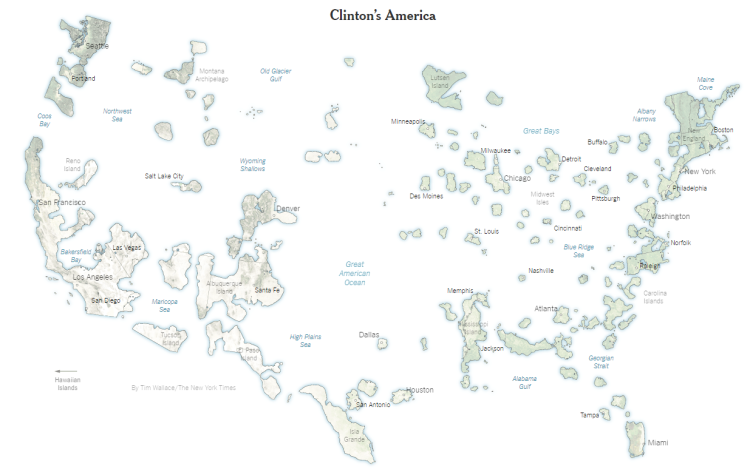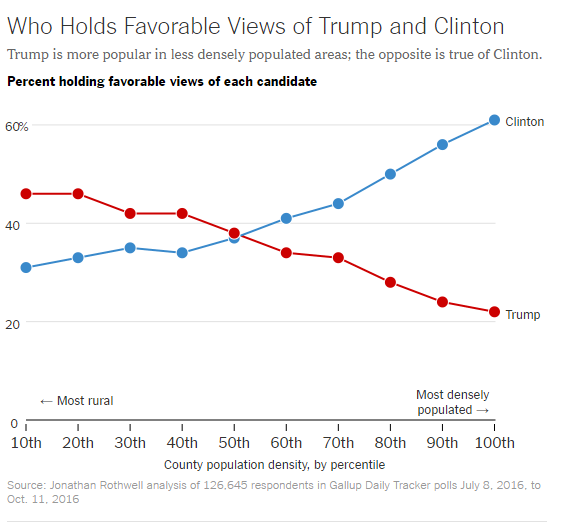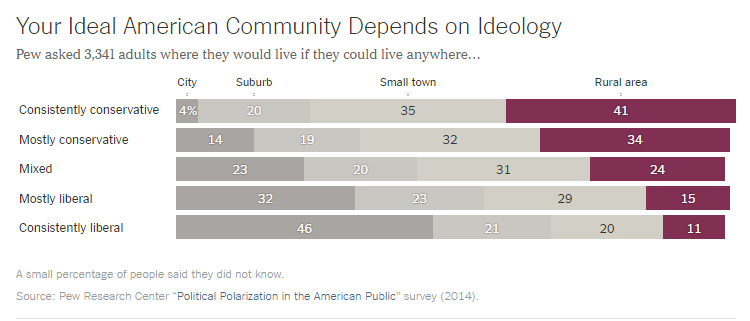Which came first, the city or the liberal? It is an interesting question. Looking at the political map from the recent election we see blue (liberal) surrounding cities and quickly turning red (conservative) the farther you travel from downtown.
I like this map showing just the areas that voted for Clinton in 2016, basically small islands surrounding every major city!

So do liberals choose to live in metropolitan areas and conservatives choose the great outdoors/suburbia? Or do cities create a liberal mindset? These are the questions addressed in the article, What’s Your Ideal Community? The Answer is Political. Maybe wide open spaces give the sense that the environment is just fine and government is really only needed for running the military. I know when we lived in rural western New York the volunteer fire department took care of the local community, and people owned guns because no one was going to come take care of a rabid raccoon for you.
People living in cities are acutely aware of the need for bigger government with strong public works and governmental infrastructure:
“a large transit agency to move people around, intricate parking rules to govern scarce spaces, a garbage truck armada to keep the streets clean. New York City, with its 24,000 restaurants and bars, needs a system of publicly posted health grades. A town with two restaurants may not. New York needs some colossal bridges connecting Manhattan and Brooklyn. A smaller community doesn’t need public-works projects on that scale. New York requires a large police force. A rural resident may need self-reliance when the closest officer is 10 miles away.”
In addition people in cities share public spaces, whereas suburbia is all about private land and yards, with local control of schools and social services that benefit only those who can afford to live in these communities. City dwellers are more exposed to diversity and appreciate the value added to their lives that such diversity brings. Income inequality is also prominently on display on the city streets with homeless people panhandling from the very wealthy. This close proximity of the haves and have-nots makes for a more liberal mindset concerning welfare. There are not many homeless people in rural Maine, so citizens away from city centers possibly don’t appreciate the need for such services.
On the take home quiz I first ask my students to grapple with this question of which came first, the city or the liberal. I was surprised that many of them struggled with the chicken or the egg argument. The first graphic below exposed their weaknesses when confronted with a sophisticated x-axis, and points out the need for using articles like this with QR courses.
Q8 Political Nbhds
- Use the What’s Your Ideal Community? The Answer is Political article[1] to answer the following questions:
- What argument is made that people in urban environments would be more liberal?
- Use both the points for the 70th percentile in the graphic below in a sentence.

- Joel Best cautions us that: “When we discover a difference between two groups, it is easy to assume that the obvious difference between the groups (e.g., race) causes other differences. It is always possible that something else, some other variable actually causes the difference.” Comment on how this relates to the claim of community being linked to political leanings.
- Use the graphic below to compute the ratio of the percentage of consistently conservative choosing to live in a rural area to the consistently liberal, scale second quantity to 1 and use in a sentence.

- In DLS Best discusses unchanging measures becoming problematic.
- How is “economic productivity” defined by BLS (not DLS)?
- Why is this definition outdated?
- If it is outdated why can’t we just change it?
[1] http://www.nytimes.com/2016/11/04/upshot/whats-your-ideal-community-the-answer-is-political.html
Thank you for posting these. I assume that DLS is Damned Lies and Statistics, but what is BLS?
LikeLike
Posted by Carrie Whittle | January 26, 2017, 1:44 pmBLS is Bureau of Labor Statistics, sorry for all the acronyms!
LikeLike
Posted by egaze | January 26, 2017, 6:24 pmThank you so much for posting this! Perfect to use in my class!
LikeLike
Posted by Laura | January 26, 2017, 8:11 pm